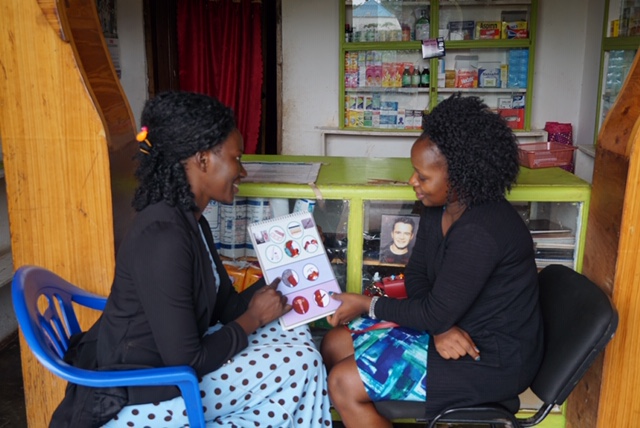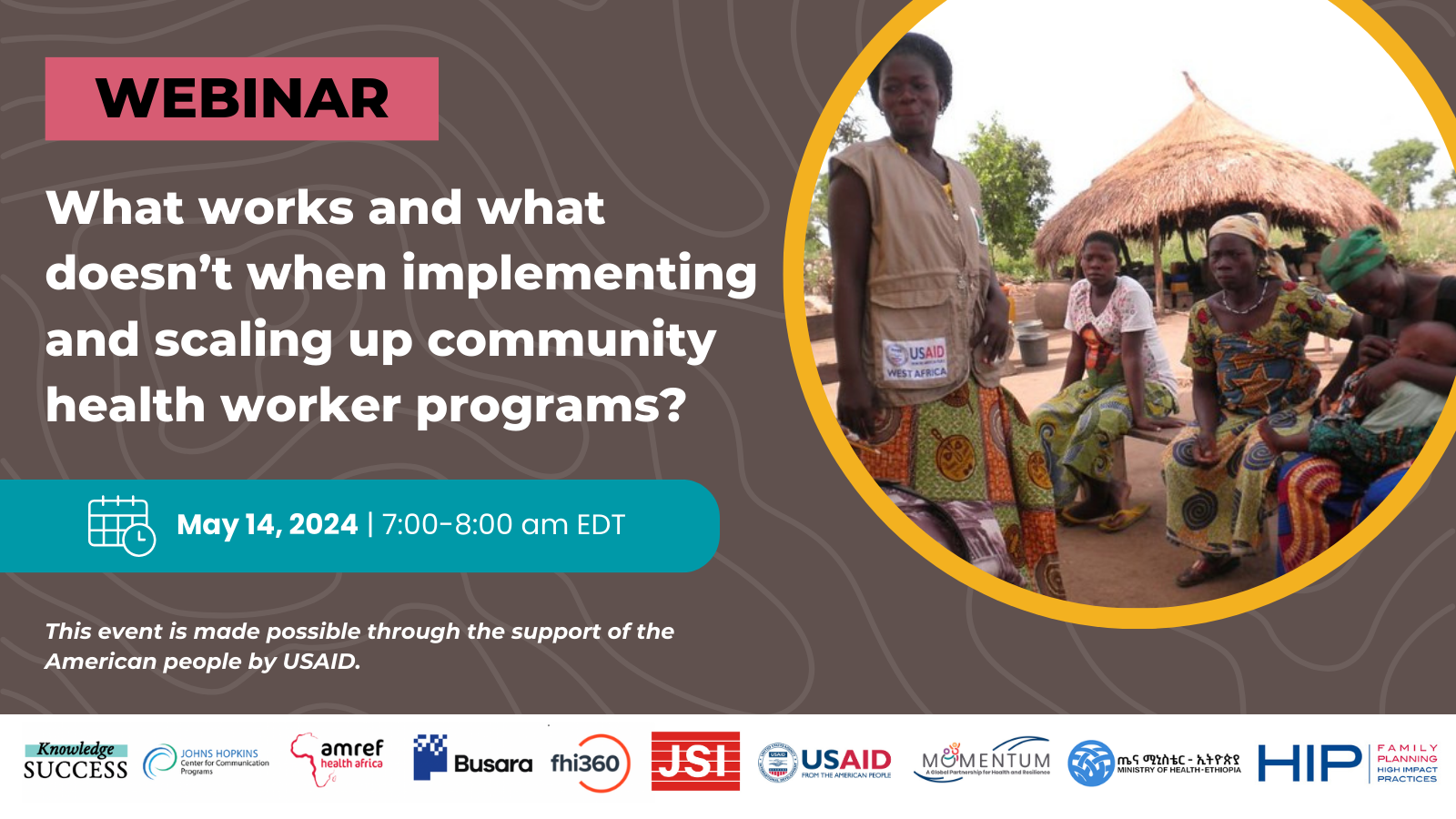Uganda is beautiful. Located on the equator, it is green and lush, filled with abundant fruit trees, tropical birds, and large families at work and play. Walk down any road and you are sure to see women carrying babies on their backs and crowds of children in colorful school uniforms. Not surprisingly, according to Family Planning 2020, the total fertility and teenage pregnancy rates are among the highest globally, and about one in three women has an unmet need for modern contraception.
Depot medroxyprogesterone acetate (DMPA), an injectable contraceptive that is highly effective and safe for most women, requires an injection every three months. Injectables are the most popular family planning (FP) method in Uganda but, until recently, were offered only by community health workers (known as Village Health Teams or VHTs) and at health facilities and hospitals. In contrast, the country’s 10,000 drug shops, which provide greater access in hard-to-reach rural areas, were authorized to supply only short-acting, nonprescription methods including condoms, pills, and emergency contraceptive pills.
Provision of family planning, including injectable contraception, through drug shops is recognized by the U.S. Agency for International Development (USAID) as a promising high-impact practice based on evidence that it is safe and effective. In 2018‒2019, FHI 360 supported the Uganda Ministry of Health (MOH) and National Drug Authority (NDA) to test and study the scale-up of injectable contraception through drug shops across 20 districts in all six regions of Uganda. This study trained NDA-accredited drug shop operators (DSOs) on all FP methods as well as how to administer intramuscular and subcutaneous DMPA―DMPA-IM and DMPA-SC, respectively.
When we began, we knew little about when and why people obtain FP methods from drug shops. Thus, we conducted 24 focus groups with community members ages 15–49 living near a drug shop where a DSO was trained to provide FP and administer injectable contraception. Because youth are a priority for FP service delivery, this post focuses on the perspectives of people ages 15–24.

Drug shops offer a convenient, discreet way for women to access injectable contraceptives. Photo: Leigh Wynne, FHI 360
What We Heard
All Respondents (ages 15–49)
- Overall, people said that they value and use drug shops for many reasons, but most of all because they are convenient.
- In general, community members assumed that the side effects of FP were an indication of poor-quality services, the DSO’s lack of education, or expired drugs. We believe clients need more education so that drug shop provision is not implicated as the source of any negative side effects.
- Because drug shops do not perform diagnostic tests, some respondents perceived that DSOs could not properly screen women before helping them select an FP method, although DSOs use a screening checklist to rule out pregnancy and contraindications for different methods.
- Clients want to be reassured that DSOs have appropriate training to offer FP. Laminated signs provided by FHI 360 to participating drug shops were effective at signifying the DSO there had been trained.
“You will find that it is always old women who come to the health center to get FP. The young women and teenagers go to the drug shops because they do not want to be seen and judged.”
– Central region focus group participant
Young Men
- Most men ages 15–24 said that drug shops provide efficient services, whereas health facilities may not have services available or may have long lines.
- They prefer drug shops because they say that DSOs are friendlier than facility health workers, and they felt DSOs were better with confidentiality than VHTs.
Young Women
- Women ages 15–24 are as concerned with stigma, discrimination, and even violence as they are with preventing pregnancy. Those using FP discreetly need to get their method efficiently to maintain confidentiality. Opinions varied widely about whether facilities, drug shops, or VHTs were best in this regard.
- Young women had more concerns about the quality of services compared to their male peers, especially regarding side effects and method failure.
- Cost is a concern for many, and drug shop fees are sometimes viewed as dishonest because the same methods are offered for free at public facilities. But, most agreed they would use drug shop services if they could afford them, or if they were free.
- Many women recognize that “free” services at public facilities are not free in practice. In remote areas, the cost of travelling to a facility and the time spent there may equal or exceed the cost of local drug shop services, especially if the facility turns out to be closed, lacks staff, or has stockouts.
- Women said drug shops can be a back-up source of contraception to prevent unwanted pregnancies when VHTs and public-sector facilities are experiencing stockouts.
For me, why I go to the drug shop is that not everyone will know my issues. She keeps well my secret. Even when the man has not accepted me for FP, still I go and he doesn’t get to know because she keeps my secrets.
– Southwestern region focus group participant
What We Learned
Drug shops are a promising distribution channel for family planning among youth and young adults because they have the unique advantages of proximity and convenience. They are the easiest way to obtain contraception outside of health facility operating hours, which is critical for young adults using FP discreetly. Regulation, accreditation, and branding for drug shop outlets help improve trust and ensure the quality and safety of services. FHI 360’s scale-up of FP, including injectable contraception, in over 300 drug shops across 20 districts contributed to the MOH’s recent announcement allowing the private sector, such as DSOs, to train clients on DMPA-SC self-injection. This policy will make contraception even more accessible to women and will increase continuation rates for women with barriers to access.
Drug shop clients represent the whole community. Teenagers in school who want to protect their future; young women who already have one or two children, looking to space their births; women and men who have large families already and are concerned that they cannot raise any more children. The District Health Offices and community leaders should communicate what FP methods drug shops can offer and clarify that policy allows approved drug shops to provide DMPA-IM, DMPA-SC, and self-injection training if the DSOs are well trained and supervised. Finally, many people are willing to pay a small amount for services. A sustainable costing and supply model should be defined that allows drug shops to make a small profit on FP injections while keeping services affordable for most local residents. These measures would help break down common barriers to the service so that women can protect themselves from pregnancy without fear.









